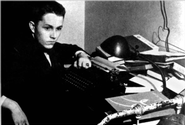
On the eve of the 50th anniversary of the publishing of Michael Harrington's article "Our Fifty Million Poor" in Commentary magazine (a liberal journal of the time), James L. Ferguson Professor of History Maurice Isserman wrote an essay titled "Michael Harrington: Warrior on Poverty" about Harrington and his essay for The New York Times Sunday Book Review. Isserman is the author of The Other American: The Life of Michael Harrington.
A precursor to his book The Other America: Poverty in the United States, published in the spring of 1962, the commentary "was a short work with a simple thesis: poverty was both more extensive and more tenacious than most Americans assumed. An 'invisible land' of the poor existed in rural isolation or in crowded slums where middle-class visitors seldom ventured," wrote Isserman. "He sought to overturn the conventional wisdom that the United States had become an overwhelmingly middle-class society. Using the poverty-line benchmark of a $3,000 annual income for a family of four, he demonstrated that nearly a third of the population lived 'below those standards which we have been taught to regard as the decent minimums for food, housing, clothing and health.'
"Harrington said he would be happy if The Other America sold 2,500 copies. Instead, it sold 70,000 within a year (and well over a million in successive editions). Among the book's readers, reputedly, was John F. Kennedy, who in the fall of 1963 began thinking about proposing anti¬poverty legislation. After Kennedy's assassination, Lyndon Johnson took up the issue, calling in his 1964 State of the Union address for an 'unconditional war on poverty.' Sargent Shriver headed the task force charged with drawing up the legislation, and invited Harrington to Washington as a consultant," Isserman explained
He concludes with this observation: "Today the poor are no longer invisible, thanks to writers like William Julius Wilson, Alex Kotlowitz and Adrian Nicole LeBlanc, and to a popular culture that has young people in middle-class suburbs emulating the styles of the inner city. But Harrington's prediction is otherwise correct. For all the changes ushered in by the 2008 election, a renewed war on poverty does not seem to be in the offing."
A precursor to his book The Other America: Poverty in the United States, published in the spring of 1962, the commentary "was a short work with a simple thesis: poverty was both more extensive and more tenacious than most Americans assumed. An 'invisible land' of the poor existed in rural isolation or in crowded slums where middle-class visitors seldom ventured," wrote Isserman. "He sought to overturn the conventional wisdom that the United States had become an overwhelmingly middle-class society. Using the poverty-line benchmark of a $3,000 annual income for a family of four, he demonstrated that nearly a third of the population lived 'below those standards which we have been taught to regard as the decent minimums for food, housing, clothing and health.'
"Harrington said he would be happy if The Other America sold 2,500 copies. Instead, it sold 70,000 within a year (and well over a million in successive editions). Among the book's readers, reputedly, was John F. Kennedy, who in the fall of 1963 began thinking about proposing anti¬poverty legislation. After Kennedy's assassination, Lyndon Johnson took up the issue, calling in his 1964 State of the Union address for an 'unconditional war on poverty.' Sargent Shriver headed the task force charged with drawing up the legislation, and invited Harrington to Washington as a consultant," Isserman explained
He concludes with this observation: "Today the poor are no longer invisible, thanks to writers like William Julius Wilson, Alex Kotlowitz and Adrian Nicole LeBlanc, and to a popular culture that has young people in middle-class suburbs emulating the styles of the inner city. But Harrington's prediction is otherwise correct. For all the changes ushered in by the 2008 election, a renewed war on poverty does not seem to be in the offing."
Posted June 22, 2009
